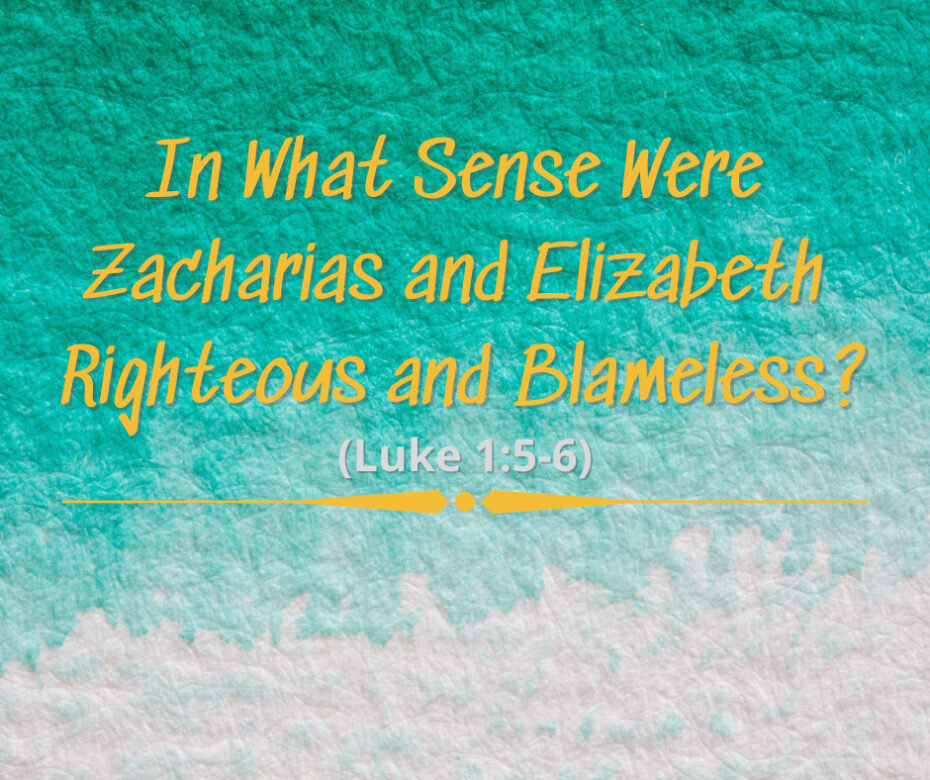During the days of Herod, there was a certain priest named Zacharias, of the division of Abijah. Presumably, Luke had verified this detail, as could Theophilus, emphasizing the historicity of these events.
Why did it mean for Zacharias to be in the division of Abijah?
Israel had thousands of priests, but only one temple, which created a problem: how could they all get a chance to serve? To solve the problem, King David had grouped them into twenty-four divisions, of which Abijah was the eighth (cf. 1 Chron 24:10). They served in rotation for one week at a time, twice a year.
Zacharias was married to Elizabeth, who was also of the daughters of Aaron, the priestly line.
Luke notes that, despite living in the days of Herod, when it would have been all too easy to go along with the religious corruption and hypocrisy that was all around them (and which John and Jesus would later expose), Zacharias and Elizabeth chose to serve faithfully. He says they were both righteous before God, walking in all the commandments and ordinances of the Lord blameless. You do not get to choose when you will serve the Lord, but you can decide how well you’ll serve Him, in whatever age you live.
However, there is a potential problem in how Zacharias and Elizabeth are described. In what sense were they righteous before God? How could anyone be righteous before God through the Law? After all, the Psalmist rhetorically asked, “If You, LORD, should mark iniquities, O Lord, who could stand?” (Ps 130:3), and the correct answer is “no one.” Likewise, Jesus would say, “No one is good” (Mark 10:18), which would include Zacharias and Elizabeth. And, of course, Paul would later insist, “by the deeds of the law no flesh will be justified in His sight” (Rom 3:20), including the flesh of Zacharias and Elizabeth. And yet, in v 5, Luke describes them both as righteous before God, not because of what they believed, but specifically because of how they behaved. They walked blamelessly in all the commandments and ordinances of the Lord. Is Luke contradicting Paul?
To resolve this apparent contradiction, some commentators have insisted that Zacharias and Elizabeth must have been righteous in the Pauline sense because they already believed in Messiah and had been reckoned righteous through faith apart from works (cf. Gal 2:16). However, that does not seem to be Luke’s meaning here, since he clarifies they were blameless because of how they walked. But how is that possible if no one is justified through the Law?
A different way to solve this puzzle is to distinguish between the relative righteousness that comes from the Law and the absolute righteousness that is imputed to the believer through faith in Christ.
For example, in Acts, Cornelius is called “a just man” (Acts 10:22), even though he still needed to be saved (Acts 11:14). That indicates he was “just” in a less-than-salvific sense. I think the Apostle Paul clarified what this sense is when he claimed to be blameless under the law, too: “concerning zeal, persecuting the church; concerning the righteousness which is in the law, blameless” (Phil 3:6, emphasis added). Hence, according to Paul, there is a righteousness which is in the law. And do you notice when he had that righteousness? He had it while he was still persecuting the church, i.e., before he came to faith in Jesus. Nevertheless, while Paul also confessed a need for the perfect righteousness found only in Christ: “not having my own righteousness, which is from the law, but that which is through faith in Christ, the righteousness which is from God by faith” (Phil 3:9). Thus, there is no substitute for the righteousness that comes from God, through faith in Christ, apart from works. That was true for Paul and Cornelius and for Zacharias and Elizabeth, too.
So in what sense were Zacharias and Elizabeth righteous and blameless? They were righteous, not in the sense of being sinless, or of already having the imputed righteousness of Christ (though they may very well have been OT believers), but in the lesser sense of doing what the Mosaic Law required sinners to do.
In other words, their legal righteousness presupposed that they were sinners in need of God’s forgiveness. Hence, they faithfully performed the Law’s many sacrifices, which implied their sinfulness, and which all pointed to the much-needed future sacrifice of the Messiah (cf. John 1:29).
Still, while their legal righteousness was not salvific in itself, it did make them fit to be used in God’s service. And perhaps as a reward for their faithfulness, God was about to announce to Zacharias and Elizabeth their role in preparing the way for their Messiah.


